A few weeks ago, someone in my Boundaries for BIPOC program asked a great question: “I make boundaries with my sons and partner (all men), but I just can’t hold or maintain them, why is that?”
The following words and thoughts ran through my head: patriarchy, minimizing voice and values, freeze, people pleasing.
In that moment I thought of a Venn diagram of sorts I wanted to create that looked at socialization, the nervous system, and values as domains to investigate how we hold boundaries. After more thought, it turned into this series of images that I posted on Instagram in April 2022. And I thought I’d expand upon it more here on The Healing Hype.
First I’ll explain the four components of this framework and how they typically manifest. Then I’ll share another image to talk about how we can be empowered within this framework.
What affects your sense of self, boundaries, safety, and worth?
I decided against a using Venn diagram because I couldn’t really derive what would come at the intersections, AND I saw all of these concepts as deeply embedded within each other. The nesting circles made so much more sense because we cannot avoid systems or socialization. Even if we actively investigate them or take actions to challenge them, they are still there and affect us, especially when we might feel a threat, aka nervous system responses.
At first, I thought about socialization, nervous system responses, and values being the three components for this model. Then I started to discern systems from socialization. I believe systems end up socializing us from a universal lens of supremacy, yet they affect us differently based on identity, as well as our lived experience, especially if that experience includes (or excludes) adverse childhood experiences (ACEs). So this is why I also added systems as a fourth component because, while there is overlap, I see systems as global influences whereas socialization has more nuance.
Systems
Systems include capitalism, white supremacy, colonization, imperialism, meritocracy, heteronormativity, classism, patriarchy, ableism, religion, and healthcare. There are probably others, so feel free to add more in the comments. I thought to add education, but I felt meritocracy covered it.
No matter who you are, these systems play a role in your life. For example, you might notice a significant increase in refugees arriving in your city during a period of time. Or you could be part of the actual refugee family who is forced out of their home country due to imperialist-driven unrest. This eventually effects jobs, class, discrimination, housing, economics, etc.
The reason I included ableism as part of systems is because of its direct connection to capitalism. Productivity is often based upon our ability to produce and our efficiency. Increased productivity leads to more profit. In this world, having a disability or chronic illness, renders those who are unable to produce as much as less worthy humans. Systems assign value and worth to humans who are just as much part of this world as the grass outside your home or the birds you hear chirping in the morning. There is no “less than” or “better than” until we make it that way.
After reading Disability Visibility and Care Work, I more clearly see how concepts like “crip time” and creating possibility and ideas for all from a place of care can be so transformative. And yet, when systems do not cater to this (or when they cater to it in a neoliberal way), people who are less “productive” are deemed worthless. Moreso, who we are is based on doing rather than being.
Religion and healthcare can definitely fall under socialization. I find these systems, specifically at their intersection so pervasive in the development of many nation’s norms - so much so that they are embedded in the “justice” system. When it becomes illegal to have an abortion, and this decision is something that is determined by the State, there are larger systemic forces at work. (I wrote this sentence two days before the leaked Supreme Court draft on Roe v. Wade. Reading it now gives me chills.) I added healthcare because, at least in the United States, healthcare access is so problematic that it is enmeshed in class and ability, limiting where someone can or cannot work or live.
When we talk about choice, values, and our nervous system, systems always have a role in shaping our baseline.
Socialization
Socialization is clearly affected by systems, yet it varies based on cultural background, geography, our role in our families, our personal identities, vocation, gender, or colorism. And, again, there’s overlap in here.
As shown in the image, the arrow start with systems pushing down to socialization, reinforcing these systems. As a Brown daughter of immigrants, I was the parentified mediator in my family and academic achievement was my top priority. The model minority myth lurched above me in subconscious and conscious ways, feeling like a failure if I got an A- (ahem, meritocracy). This myth has systemic origins, and it created a wedge between Asian Americans and Black folks.
Being a parentified perfectionist made me an expert people pleaser. Because if I wasn’t making others happy, did I even have any value? Did I belong? For me, the intersection of systems and socialization were crystal clear in my life. What about you?
Nervous System Responses
I talk and think about the nervous system A LOT. This is because after I learned about it, it was impossible to ignore. We have all heard of fight or flight, but it is often contextualized as an individual trait or response. When in reality, our nervous system responds to threats that are bigger than ourselves or our immediate environment. In fact, our bodies often response to perceived threats, signals that indicate to our nervous system (which doesn’t have eyes, nor does it know our age) there there is a *THREAT *!
The next time we label someone who runs away from a social situation as “immature” or someone who gets into a fight as “violent”, it’s important to reframe this response from a trauma-informed lens. This doesn’t absolve someone of harm, bigotry, or responsibility, but it does help to explain how they are perceiving a threat, which can inform our response as well as larger systemic policy. Whether it’s real or not (ahem, white folx being threatened by immigrants “taking” their jobs and other BS), that response is true for them.
I define safety as “the absence of threat and the presence of connection”. (I wish I knew where I saw this definition so I could give the human appropriate credit, so if you’re out there and you see this, let me know!) I think safety is often just considered as “the absence of threat”, so I love how acknowledging connection is also a reminder that human connection is necessary for humans to survive. We are not here to do everything on our own. We need each other.
So when forces like white supremacy and colonization disenfranchise BIPOC, when imperialism reinforces classism and economic inequality, when healthcare systems make people jump through hoops to get basic care, especially in some countries more than others, human survival is threatened. And as I explained in one of my very early posts, intergenerational trauma passes these survival and trauma responses to future generations. This image below by therapist Ayan Mukherjee, is a perfect illustration of how systems and socialization inform nervous system responses.
So considering the framework I illustrated, the forces pushing down from systems, socialization, and nervous system responses can literally take over our bodies. These forces, especially if you are marginalized, minimize your worth and, subsequently, your values. OR they might be so strong that you adjust your values to what is dominant. OR your value system aligns with values embedded in dominant systems. One way or another, these forces influence the values we choose to live our life by.
Values
If you have worked with me before, you know how much I value…values. I also see values as offshoots of our inherent worth. Our worth exists because we exist in this world. And our values are an embodiment of our personal experiences, which are formed by systems, socialization, our nervous system, as well as our personality.
I like to talk about my values of curiosity & humility, vulnerability, compassion, connection, unlearning, and liberation because they are incredibly influenced by my lived experience AND my own Nisha-ness. When I have my clients determine their values, I often ask them to think of a story from when they were younger, or even recently, that exemplifies why a specific value is important to them. Without fail, they always have at least a couple stories to share for each value, if not more. And I’ve noticed how these stories always include a components of their socialization based on race, gender, sexuality, income level, ability, ACEs, etc.
Here’s the thing, sometimes our values feel so small, crushed by the weight of the world around us. Yet, they are also what sustain us. I think this is beautiful. I’m not trying to romanticize oppression and inequity, but what the world offers us is also what we respond to. It’s a sort of reciprocal response of our humanity and our relationship with the elements around us.
And this is why, I continue this framework to show how we can use our values to express our worth and impact the world. Yes it will be uncomfortable, and yes, change is possible because our worth and values are powerful beyond measure.
Embody your values, impact the world
Impacting the world, changing the world, and subverting systems doesn’t happen overnight and it doesn’t happen alone. This is something that will take generations. It will take solidarity, empowerment, community, care, and imagination.
This doesn’t mean we shouldn’t try. It means we are all capable of planting seeds. Like most plants, they take time to cultivate, tend to, and witness. And values can serve as the seed. These seeds are planted by your hands, which represent your inner worth. They sprout into stems and leaves and blossoms from the intention and care you plant them—and they are rooted for generations to tend to as well.
As you can see, the difference between this image and the one earlier is that the arrow starts with values and points out toward nervous system responses, socialization, and systems.
First of all, do you know your values? Oftentimes we have values that are driving us, but we might not know what they are. Or we express them inconsistently. I would say that I grew up with the value of equality. I wanted everyone to have a fair chance and be equal. This was a result of me seeing inequality, being indoctrinated into post-racial America after learning about MLK and Rosa Parks, seeing other people suffer, as well as being teased by white kids throughout my school years. It made me have strong feelings about inequality, but I didn’t understand a lot of nuance from a sociopolitical perspective.
For me, my value of equality subconsciously shifted to equity, and, is now liberation. This, too, might change. This shift occurred because I was exposed to more information in the form of political and economic ideology and witnessing and listening to other people’s experiences—especially identities and populations I was never exposed to when I was younger.
Since I’m now much more aware and conscious of my values, I do my best to embed them in the way I move through the world. I think about them as the foundation of my offerings and creations. For example, when I started my podcast MigrAsians, which focused on the stories of creative and political Asians, I made sure that all of the creative work including the cover art, music, and editing, was done by other Asians. This was a more specific value for the podcast. As a coach, I do my best to come from a place of curiosity & humility (watch this video to learn why I pair these together as one value). I am not the person who knows all the answers. In fact, I know much less than my client does. My job is to ask questions and reflect from a place of curiosity & humility as well as share about my own life (vulnerability) while having compassion for my client’s story, identity, and intergenerational trauma. To me, it is very clear how my values are reflected in my life, play, and work.
What are your values? How do you reflect them in your life, play, and work?
When you start with your values and are committed to them, you are committed to what matters to you most. And this impacts how you perceive your nervous system responses and the feelings that come with it. Your anger or fight response shifts from feeling “out of control” to feeling righteous. If someone makes a racist or sexist remark and you freeze, you might try to resource yourself instead of wondering what’s “wrong” with you. Or you can pause to remind yourself that the person or place isn’t a true threat, and your response is something that has been learned due to oppressive systems and socialization.
I think it’s also important to get to know your nervous system and be with your nervous system so you have a better idea about your triggers and glimmers. I always recommend the book Polyvagal Theory in Therapy as well as My Grandmother’s Hands to learn about the nervous system from a systemic, embodied, and neurological perspective.
When I talk about being intentional with your values and your nervous system, I’m talking about healing being a return to yourself. And grounding in yourself and your truth is a form of de-socialization plus re-socialization. What radiates out will have an impact in your social circles. As a result, your socialization becomes a resource rather than a burden. For example, when you have a strong sense of your commitments, you create firm boundaries that may shift who you choose to be around or ask for help. This co-regulation is magic for the nervous system and puts you in a centered place to contend with your socialization.
And, dare I say it, I believe this has the power to challenge, shift, and subvert systems as they are. It won’t happen tomorrow, or the day after that, or likely in some of our lifetimes. There will be resistance and there will be growth, pruning, and tending. I truly believe that the seeds we plant can grow into new creations, new legacies, and new ways of relating to the world.
In the end
This framework helped me to connect and contextualize systems with our personal values through a compassionate lens of safety. I hope it also helped you. If there’s one thing we’ve seen this past week, we cannot ignore how systems make decisions that clash with our values, collapse our nervous systems, and make us question our worth. They have the ability to directly harm people’s health and well-being…or with solidarity, imagination, and practice, the tides can turn.
I’d love to hear your thoughts, so please leave a comment.
If you want to support reproductive justice directly, you can find more resources here: https://tinyurl.com/AbortionResourceKit

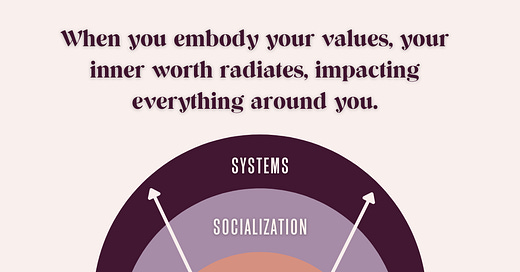

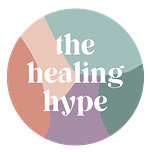

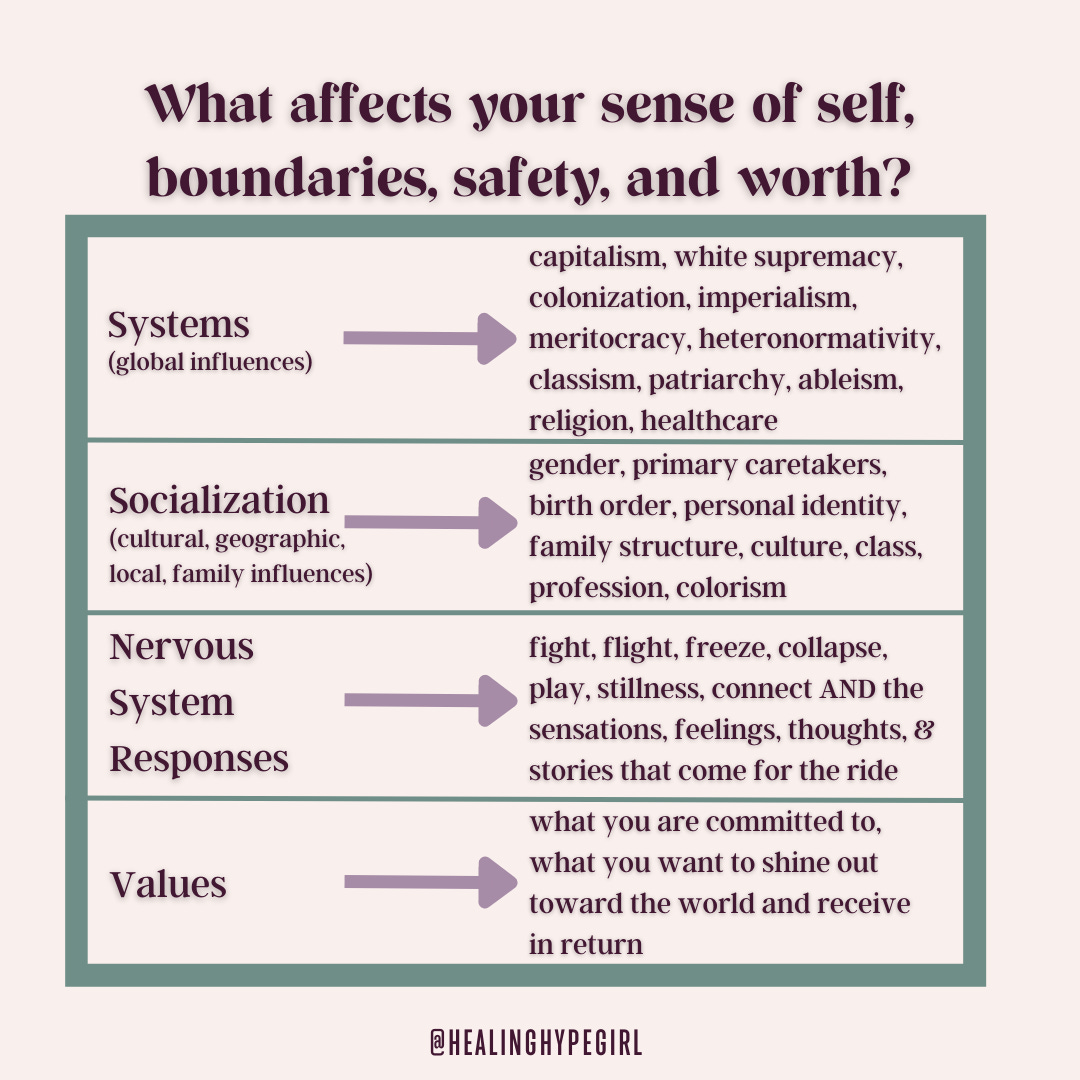
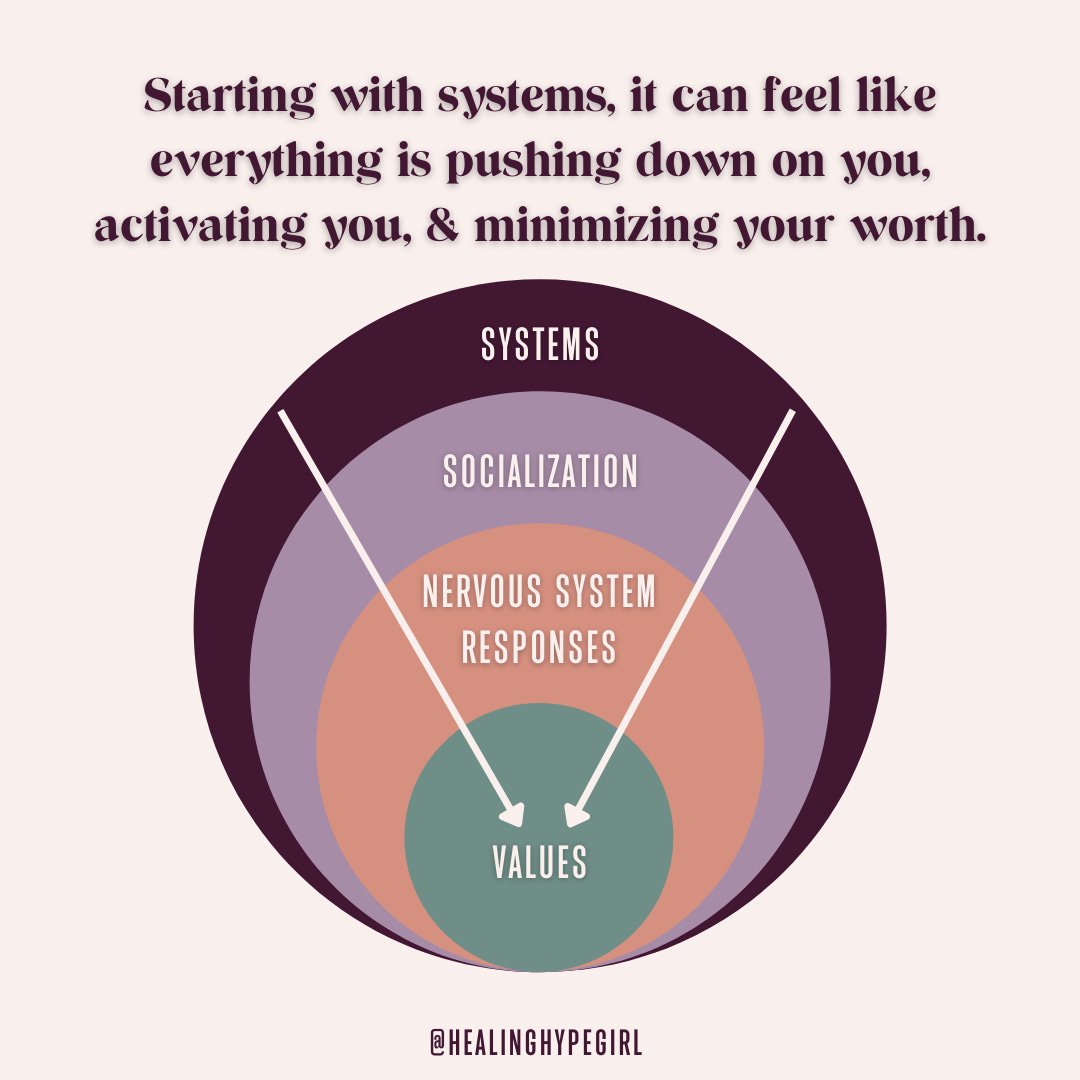
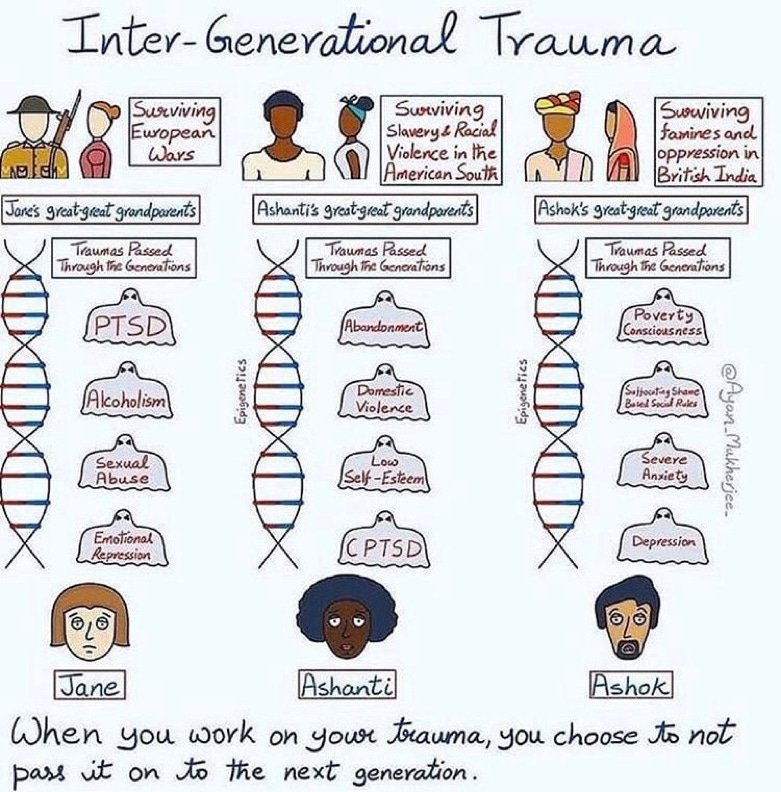



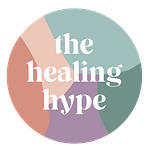


Share this post